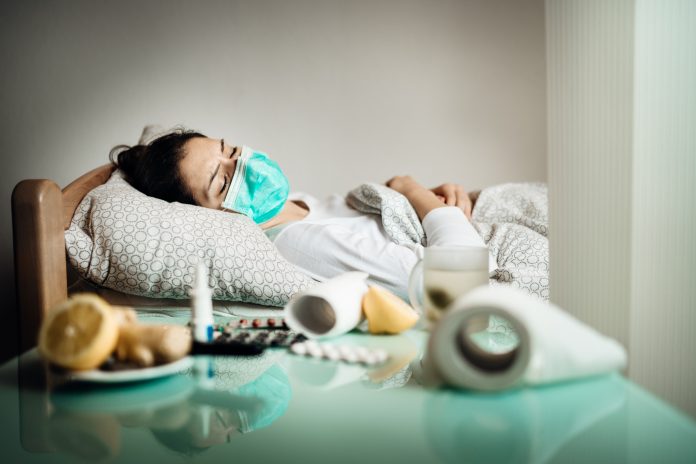Hayley Broughton-McKinna, senior trainer at PMAC – mental health training and wellbeing professionals, offers advice on how to cope with other aspects of COVID-19 such as mental health and wellbeing
There is no disputing the link between our physical and mental health, and coronavirus is no exception. For those struggling with coronavirus, the emotional impact cannot be underestimated. Being physically unwell compromises your resilience levels, and can severely drain you of your emotional strength and ability to utilise your coping mechanisms.
The reality of going from hearing about coronavirus to showing symptoms and/or testing positive for the virus can be difficult to digest. It may feel incredibly surreal and difficult to come to terms with. You may feel detached from the reports and stories on the news and social media, and the concept that you even have to try to accept that you are now facing this devastating virus may feel baffling.
Coronavirus diagnosis
For some, knowing that you are contagious can be an incredibly bizarre reality to come to terms with. Coronavirus is not contagious in way that we often imagine as depicted in films or on television. With coronavirus you have no rash, the symptoms do not develop quickly before your very eyes. It is one thing to have the flu or common cold, it is another to be fighting a virus that is causing a global pandemic.
Some people may struggle with imagining others reacting with disgust if they knew, which can trigger painful feelings of rejection and abandonment. This is likely to be even more so the case with those who may be recovering from trauma, particularly abuse related. Those struggling already with deep-seated issues surrounding shame and self-worth may feel particularly low and may struggle to comprehend the emotional. For those living alone, loneliness can but only exacerbate such feelings, without somebody there for comfort, reassurance and to ground you.
Fear of the unknown
The fear of the unknown and feeling out of control is also a very real and daunting prospect for many people with coronavirus. With so little known about coronavirus and no current cure, there is little reassurance for those with coronavirus as to what they can do to help themselves. Many report having never felt so ill, which is terrifying for those with a baseline of good health, let alone for those who have contracted coronavirus on top of a pre-existing health condition. There is little medical intervention, and the prospect of receiving what little intervention that does exist is incredibly scary, as it means that your condition has deteriorated to the point that you need hospitalising.
Remain calm
Beyond the emotional impact of the fear and uncertainty that comes with having coronavirus, the physical symptoms alone can be enough in themselves to invoke panic. Struggling to breath is terrifying enough in itself, and can trigger your fight or flight response. This is turn may make you even shorter of breath and light-headed, which can trigger more panic and leave you more breathless, creating a snowball effect. Grounding yourself and remaining calm is imperative therefore for both physical and mental wellbeing with coronavirus.
Life after coronavirus
Not knowing what lies ahead, what will help, and whether or not you need to prepare for the worst is undoubtedly an emotional whirlwind for anyone with coronavirus. Many may contemplate how they will cope should things go downhill, and how their loved ones will manage. It is understandable therefore that those struggling with coronavirus may find themselves re-evaluating their lives. Do the people that they love to know that you love and appreciate them? Does your current way of living fulfil you? If not, then why not? What needs to change? Whilst many coronavirus survivors may come out of this with a renewed zest for life and a vow to never take anything for granted again, others may struggle to return to the lives they have been living. They may feel that things need to change, and life-changing decisions may need to be implemented.
Feeling guilty
On top of all of this, many of those facing coronavirus may also battle feelings of guilt. They may fear having inadvertently given others the virus, and feel guilty for this. For those fortunate to be self-isolating with others who are able and willing to help and look after them, they may feel like a burden and concerned that they may be putting those around them at risk. Many may even feel guilty that they have others simply worrying about them.
Surviving COVID-19
Recovery from coronavirus and being fortunate to come out of the other side whilst wonderful, can paradoxically also be a source of emotional difficulty for coronavirus survivors. To survive when others around you are less fortunate can again lead to feelings of guilt and confusion, which can be incredibly perplexing to others who expect you to feel elated. If not directly impacted by the loss of someone you care about yourself to coronavirus, then the fear of crossing paths with somebody who has lost a loved one to corona knowing that you survived may also feel like a daunting prospect.
It is as important therefore to pay consideration to the emotional wellbeing of a person going through or even having recovered from coronavirus. Going through (and surviving) an illness so devastating that it has brought the world to its knees, is a whirlwind not to be underestimated.
To those going through or having survived coronavirus: we see you, we are proud of you, we salute you. Try to be kind to yourself.











